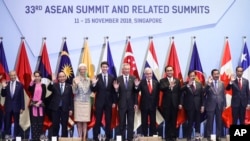A top U.S. Defense Department official told ambassadors and other leaders from Southeastern Asian countries that the Indo-Pacific region is “our priority theater” even as China makes inroads in an area it considers its backyard.
Assistant Secretary of Defense for Indo-Pacific Security Affairs Randall Schriver, spoke at the US-ASEAN Business Council Wednesday.
He emphasized the need for nations in the region to consider the options offered by the United State and China, which are jockeying for geopolitical and economic influence in the area, before devising their individual Indo-Pacific strategies.
“You don't choose between countries or capitals but can you choose respect for sovereignty and independence of all nations large and small,” Schriver said. “Can you choose peaceful resolution of disputes? Can you choose free, fair, reciprocal trade and investment, which includes protections for intellectual property? Can you choose to support adherence to international rules and norms including freedom of navigation and overflight?”
Schriver said these were not “U.S. positions or principles or values but more universal.” He made his remarks as skepticism is growing over China’s Belt and Road Initiative, an infrastructure investment program that comes with “debt risks, governance risks (corruption and procurement), stranded infrastructure, environmental risks and social risks,” according to the World Bank.
The Association of Southeast Asian Nations (ASEAN) is a 10-member regional bloc with a combined GDP of $2.4 trillion, a population of 630 million, and a landmass covering more than 4.4 million square kilometers (1.7 million square miles), according to the council’s website. Founded in 1967 by Indonesia, Malaysia, the Philippines, Singapore, and Thailand, ASEAN has since expanded to include Brunei Darussalam, Cambodia, Laos, Myanmar (Burma), and Vietnam.
“There are practical ways that we look forward to working with the member states of ASEAN to uphold the international ideals,” Schriver said. “We look for partners to invest sufficiently in their own defense to strengthen deterrence, to take actions that uphold the rules-based international order which keeps the playing field level.”
“We look for countries to ... think carefully about defense sales as you're not only buying equipment and capability, you're investing in long-term relationships,” he added.
In May, the U.S. Navy angered China by sailing one of its warships near the disputed Scarborough Shoal in the South China Sea. China claims almost all of the strategic waters, where there are competing claims by Brunei, Indonesia, Malaysia, the Philippines, Taiwan and Vietnam.
This report originated with VOA’s Mandarin Service.




